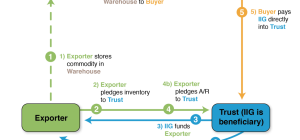 Running your own business is financially draining when you’re starting up. Then it becomes a budget balancing act when it comes time to grow the business. Between employees, equipment, inventory, rent, marketing and more, loans help small businesses manage all the moving pieces.
Running your own business is financially draining when you’re starting up. Then it becomes a budget balancing act when it comes time to grow the business. Between employees, equipment, inventory, rent, marketing and more, loans help small businesses manage all the moving pieces.
When it comes to funding a small business, it’s easy to become overwhelmed by all the financing options. Lenders, including online business loan providers, have more tools at their disposal than ever before. The guide below is an overview of loan options that can help business owners meet their goals.
Secured vs Unsecured Loans
All loans for small business financing are either secured or unsecured. Secured loans are issued based on collateral whereas unsecured loans are based on credit worthiness. There is less risk involved with unsecured loans, but the requirements are typically higher.
Fixed Rate vs Adjustable Rate
Loans can also be either fixed rate or adjustable rate. Fixed rate, when a specific interest rate is set for the life of the loan, is more common today because rates are so low. The interest amount on an adjustable rate loan could start out low but fluctuates over the life of the loan. Fixed rate loans are more predictable, which makes it easier to budget and make projections.
Long-Term vs Short-Term
Long-term and short-term refers to the duration of the loan. Generally, short-term loans are one year or less, and payments are made on a monthly basis. They are commonly used to cover the cost of repairs, small projects, boost inventory and cover accounts payable.
Long-term loans are any loans that last longer than a year, usually up to seven years. Businesses use long-term loans for larger investments like expansion, acquisition and refinancing other loans. Like short-term loans, repayments are made monthly for the life of the loan.
Start Up Loans
Thousands of businesses open their doors every year. Most of the time launching a business takes a substantial amount of capital. Some lenders provide long-term loans specifically for start-up capital that can be used by an independent business or franchise start-ups.
Small Business Administration Loans
Small Business Administration (SBA) loans are government-backed loans that are made and managed by private lenders. Each loan program has specific qualifications that must be met, such as a good to excellent credit score. It’s best to read through the qualifications before applying.
Equipment Loans
As the name suggests, these loans are designed to pay for equipment that’s needed for business operations or expansion. The equipment serves as the collateral, which means if payments are missed the equipment can be repossessed. Equipment loans are typically long-term, fixed loans with monthly repayments.
Merchant Cash Advance
With a merchant cash advance, you are able to borrow against regular credit card sales. In exchange for the cash advance, businesses give the lender a portion of the daily credit card sales plus interest. However, this financing option usually comes with a very high annual percentage rate.
Line of Credit
A line of credit is different from a loan. This financing option is similar to a home equity loan or credit card and is ideal for many businesses. The lender will approve a business to borrow up to a certain amount. You can tap into the credit line as needed and interest will only be charged on the amount used.
Like loans, there are different options for lines of credit:
- · Revolving Credit
- · Inventory-Based Line of Credit
- · Accounts Receivable Line of Credit
Revolving credit lines can be used over and over again after repayment without reapplying. The latter two vary in the collateral used to decide on the amount of the credit line. Typically an accounts receivable line of credit is a short-term working capital loan that covers a 1-2 month period. These are good options for businesses that want to keep their cash on hand for emergencies and regular operations.
No matter what option you choose to finance your business, it’s important to use a lender that has a successful track record. Businesses should consider their lender to be a partner that can help your company grow over time.







